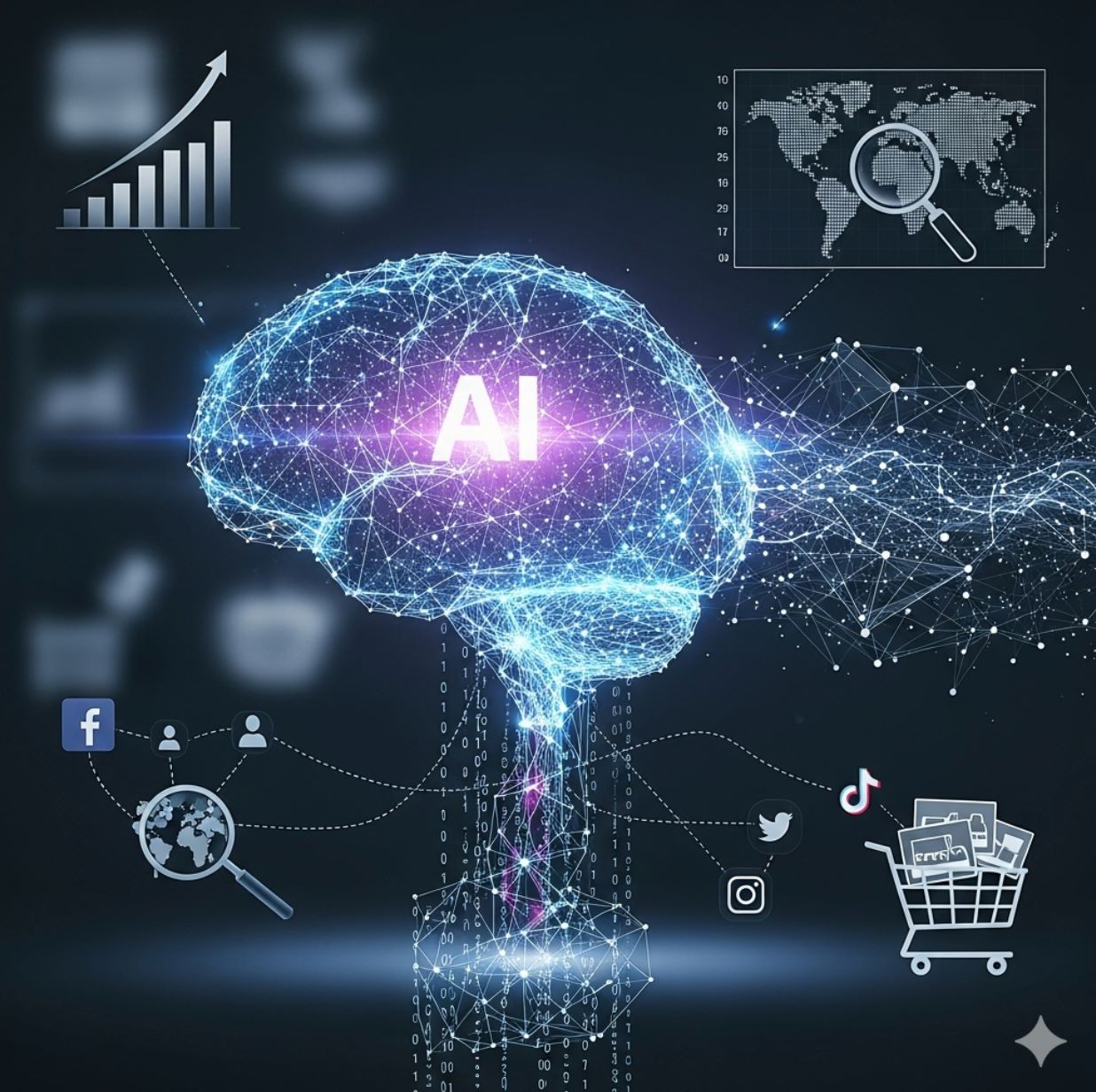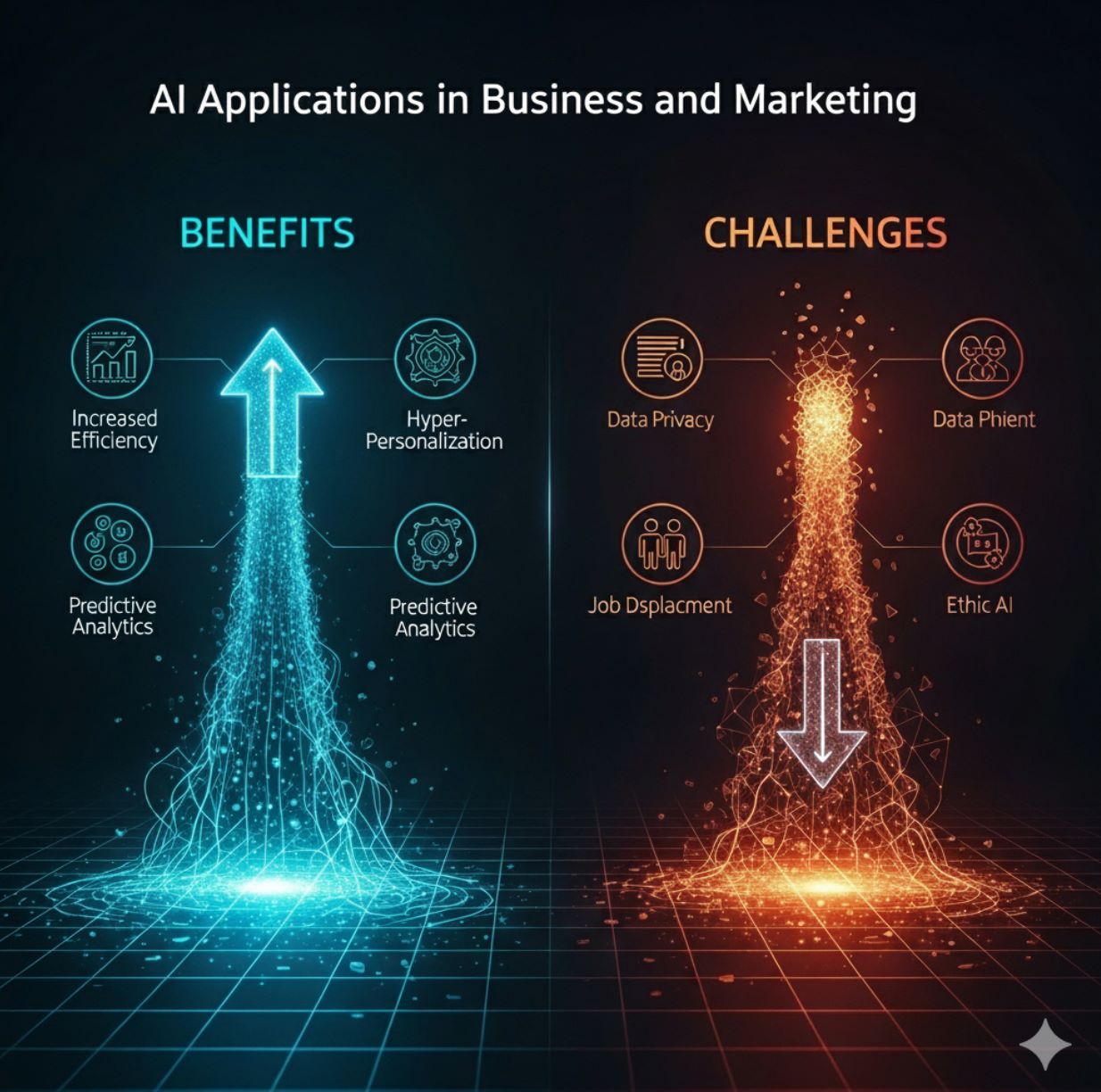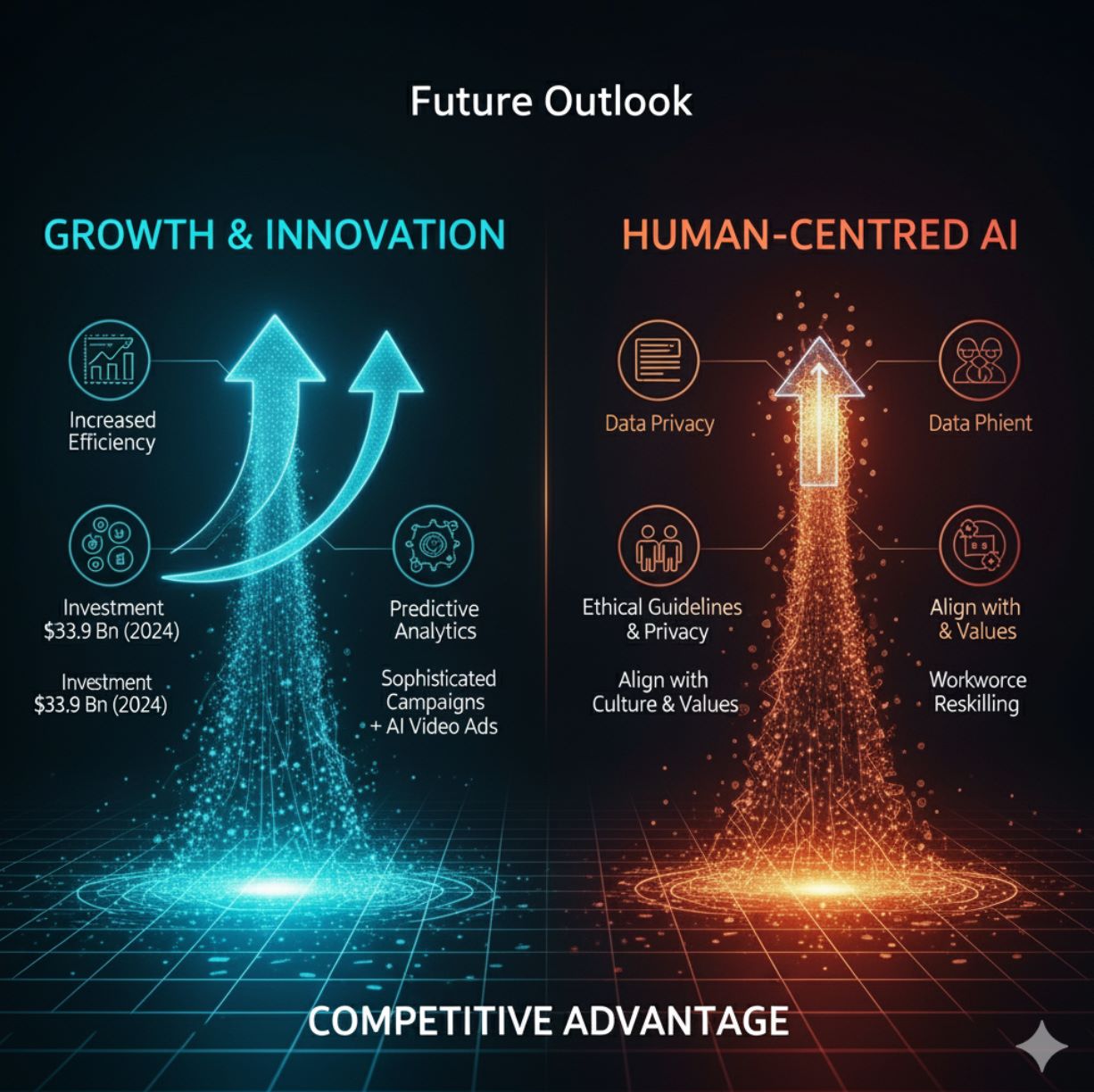AI Applications in Business and Marketing
Artificial Intelligence (AI) is transforming the way businesses and marketers operate, driving smarter decisions, personalized customer experiences, and higher efficiency. From predictive analytics and automated customer service to personalized content and data-driven campaigns, the applications of AI in business and marketing are reshaping strategies and creating a competitive edge in today’s digital economy.
Artificial intelligence (AI) is reshaping modern business and marketing by combining data-driven automation with human insight. Today's AI systems use machine learning and analytics to process huge volumes of customer and operational data in real time.
Organizations using AI in 2024 (up from 55% in 2023), with over two-thirds planning to increase AI investment
- 56% Actively implementing AI
- 44% Waiting for solutions to mature
- 70% Predict larger AI role soon
- Focus Training staff & building skills
This suggests a gap between enthusiasm and expertise: organizations must train staff and build AI skills to leverage tools effectively. Marketers also voice concerns about data bias and ethics as AI grows more prevalent. Nevertheless, most expect AI's role to expand significantly.
AI in Business Operations
AI is already streamlining a wide range of business functions. In operations and logistics, machine learning models optimize inventory, predict demand, and automate routine tasks. In finance and risk management, AI detects fraud patterns and assists with financial forecasting. Crucially, AI also enhances customer service.
AI Agents (2025)
Autonomous workflow management
- Handle customer interactions
- Process payments & orders
- Fraud detection & scheduling
Salesforce Agentforce
AI-powered business automation
- Simulate product launches
- Orchestrate marketing campaigns
- Minimal human intervention
Real-time Intelligence
Instant business insights
- Up-to-minute dashboards
- Revenue predictions
- Expense anomaly detection
These digital assistants work in tandem with employees, freeing humans to focus on strategy and creative work.
— Industry Analysis on AI Integration
AI also drives real-time business intelligence. Applications like SAP Joule integrate AI with enterprise systems so that executives see up-to-the-minute dashboards and forecasts. For example, Joule can analyze historical sales data and market trends to predict revenue or highlight anomalies in expenses within seconds.

AI in Marketing
AI is driving a transformation in marketing by enabling hyper-personalized, data-driven campaigns. Below are key application areas:
Personalization & Targeting
AI algorithms analyze customer demographics, behaviors, and purchase history to create highly targeted campaigns. Predictive models can forecast which users are most likely to open an email or buy a product, allowing marketers to send the right message at the right time.
Netflix Example
Amazon Engine
Consumers more likely to buy from brands delivering customized content (Deloitte)
Content Creation & Optimization
Generative AI greatly accelerates content production. Tools like ChatGPT, Jasper AI and Microsoft Copilot can draft ad copy, social posts, emails and even short videos in seconds.
Advanced platforms like HubSpot's AI suite can manage lead generation and A/B testing, and programmatic tools automatically adjust ad bids and targeting to maximize ROI. In advertising, marketers also use AI for tasks like optimizing keyword bidding and personalizing ad creative across audiences.
Predictive Analytics & Insights
AI excels at mining marketing data for insights. Machine learning models sift through campaign metrics, web analytics, and social media data to uncover trends that humans might miss.
Data Analysis (41%)
Market Research (40%)
- Identify emerging customer segments
- Forecast sales trends accurately
- Predict next hot product categories
- Guide budget allocation decisions
- Inform creative direction strategies
Tools now integrate natural language processing to summarize customer feedback and social sentiment, helping brands adjust strategies on the fly. By turning raw data into recommendations, AI supports smarter, more agile marketing.
Chatbots & Automation
AI chatbots are transforming customer engagement by providing instant, 24/7 customer service on websites and messaging apps. They can answer FAQs, recommend products, and even handle transactions.
Email & CRM Automation
Personalized communication at scale
- Personalized subject lines
- Optimal send times
- Lead scoring & follow-ups
Social Media Monitoring
Real-time brand intelligence
- Sentiment analysis
- Viral trend detection
- Crisis management alerts
Advanced bots and virtual assistants are "redefining customer service and marketing interactions," offering personalized assistance and building loyalty.
— Harvard Business Experts

Benefits and Challenges
Clear Advantages
- Massive speed improvements
- Significant cost savings
- Automated repetitive tasks
- Enhanced creativity focus
- Better customer engagement
- Increased revenue potential
Key Concerns
- Quality control issues
- Data bias problems
- Privacy compliance
- Brand voice consistency
- Skills gap challenges
- Need for human oversight
AI offers clear benefits: massive speedups and cost savings. As one report notes, AI can generate dozens of ideas or pieces of content in the time it takes a human to come up with one. Automating repetitive tasks lets teams focus on creativity and strategy. According to marketers, AI's advantages include speed, a broad knowledge base, and freeing staff from tedious work.
These gains often translate into higher revenue: AI-driven personalization and optimization help companies achieve better customer engagement and loyalty.
Finally, organizations need the right talent: many marketers feel unprepared and call for more AI training. Companies that combine AI with human creativity – empowering staff with AI tools rather than replacing them – stand the best chance of success.

Future Outlook
AI's role in business and marketing is set to grow. Investment is booming: Stanford reports that private funding in generative AI reached $33.9 billion globally in 2024. Forward-looking companies are already budgeting heavily for AI: one survey found that some high-performing brands devote at least 20% of earnings to AI-driven marketing and personalization.
$33.9B Investment
20% Budget Allocation
Advanced Campaigns
Reskill Workforce
Train teams on AI tools and strategies
Establish Ethics
Create clear governance guidelines
Gain Advantage
Achieve competitive differentiation
Meeting customer expectations for personalization will require careful use of first-party data and respect for privacy.
— Deloitte Research
As these tools mature, we can expect even more sophisticated campaigns (for example, AI-generated video ads) and deeper customer insights. At the same time, experts emphasize a human-centered approach.
Overall, businesses that embrace AI responsibly – reskilling their workforce and establishing ethical guidelines – are likely to gain significant competitive advantage.

Key Takeaways
In summary, AI applications in business and marketing span a wide range of powerful tools: from data analytics and predictive modeling to chatbots and content generation. By leveraging these technologies, companies can target customers more effectively, automate tasks, and innovate in ways that were impossible before.







No comments yet. Be the first to comment!